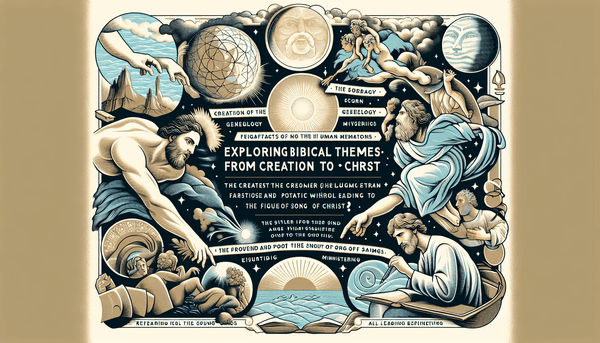Lending and Borrowing in the Bible
The Bible speaks to the heart of financial interactions, advocating for a system of lending and borrowing that is grounded in generosity and compassion. In Deuteronomy 15:6, believers are encouraged to lend generously to their neighbors, a sentiment echoed in Luke 6:34-35, where Jesus teaches us to lend without expecting anything in return, highlighting the virtue of selfless giving. However, the wisdom of scripture also comes with caution, as noted in Proverbs 22:7, which warns of the dangers of becoming enslaved by debt. This balanced approach is further illustrated in Exodus 22:25 and Leviticus 25:35-37, which advise against charging interest to the poor, thus emphasizing the importance of ethical financial practices and the underlying principle of love that should govern our fiscal dealings (Romans 13:8).
Biblical Narrative: Rachel and Laban's Household Gods
The story of Rachel stealing her father Laban's household gods, as recounted in Genesis 31:19, is a narrative steeped in cultural context and human complexity. Rachel's motivations for taking the idols may have been to secure her family's future or to uphold the practices of her time. This action, while not condoning idolatry, reflects the Bible's commitment to historical authenticity and its recognition of humanity's imperfections. The account invites us to consider our own sources of security and fulfillment and encourages us to rely solely on God, as the ultimate source of protection, rather than on the material or symbolic idols of our lives (1 Samuel 15:23; Joshua 24:2).
Dietary Laws and Clean vs. Unclean Animals
In Leviticus 11:9-12, the Bible sets forth dietary laws distinguishing between clean and unclean animals, which include guidelines on what fish the Israelites could consume. Catfish, lacking fins and scales, fall into the category of unclean animals according to these ancient laws. While these regulations might seem distant from contemporary concerns, they offer insights into the symbolic and possibly health-related reasons behind such distinctions. The New Testament revisits these dietary restrictions, suggesting a new understanding of what is clean, as seen in Peter's vision in Acts 10:11-15 and Jesus' declaration in Mark 7:18-19, which reflects a broader spiritual acceptance that transcends old limitations.
Conclusion
The scriptures continue to be a foundational guide for countless believers, providing insight and direction for various facets of life, including our understanding of animals in eternity, relationships, love, and the future. This exploration of biblical teachings on lending, faith, Rachel's story, and dietary laws reveals that the Bible's guidance is as applicable today as it was in ancient times. It offers a way to navigate our financial dealings with integrity, deepen our understanding of faith, learn from the complexities of historical narratives, and understand the significance of cultural practices. Ultimately, the Bible remains a vital source for anyone seeking to align their life with enduring spiritual and moral principles.
FAQ
Q: What does the Bible say about lending money?
A: The Bible encourages lending money generously without expecting anything in return (Deuteronomy 15:6, Luke 6:34-35), but it also warns against the dangers of becoming enslaved by debt (Proverbs 22:7).
Q: What is faith in the simplest way to understand?
A: Faith is trust and confidence in something or someone, and in the Bible, it is often associated with trust in God and His promises (Hebrews 11:1).
Q: What does the Bible say about borrowing?
A: While the Bible does not prohibit borrowing, it advises doing so responsibly and warns against the potential bondage that comes with excessive debt (Proverbs 22:7).
Q: Are there any specific dietary laws mentioned in the Bible?
A: Yes, the Old Testament lays out dietary laws, including the prohibition of consuming sea creatures without fins and scales, such as catfish (Leviticus 11:9-12).






